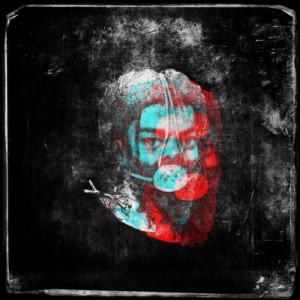By CODY MILLER
Music Reviewer
[email protected]
Cody Miller, ’14, is an avid music enthusiast who has listened to a new musical album every day since eighth grade. Though he enjoys many genres of music, two of his favorites are jazz and rock.
 With this previous release A Sufi and A Killer, Vegas resident, yoga teacher, and trip hop extraordinaire Sumach Ecks (a.k.a. ‘Gonjasufi) unleashed perhaps one of the most memorable (if erratic) electronic albums of recent memory. On the release, Ecks pulled no stops as he effortlessly waded through the waters of hip hop, world beat, dub, and low-fi.
With this previous release A Sufi and A Killer, Vegas resident, yoga teacher, and trip hop extraordinaire Sumach Ecks (a.k.a. ‘Gonjasufi) unleashed perhaps one of the most memorable (if erratic) electronic albums of recent memory. On the release, Ecks pulled no stops as he effortlessly waded through the waters of hip hop, world beat, dub, and low-fi.
MU.ZZ.LE, Eck’s second release, is a 25 minute, 10 song “mini-album,” which feels extensively more subdued than it’s predecessor, with a focus on atmosphere over immediate visceral release.
Shifting away from the raucous energy of its predecessor, the album is cast under an ambiance of swirling, psychedelic, and lethargic sonic experimentation. Unpredictable, warbling flourishes of piercing synths, bit-crushed samples, and fluttering Rhodes piano shoot out seemingly at will. Ecks places the listener within a canopy of forlorn abandonment guided by eerie soundscapes and gristly, low-fi drum beats.The album’s aura of desolation is only amplified by Eck’s characteristically harrowing, haunting moan.
These tracks are an intriguing amalgamation of reggae, dub, soul and trip-hop, while still retaining this atmospheric melancholy. In many ways, Gonjasufi draws substantially the cryptic chill and sensuality of trip-hop purveyors Tricky and Portishead. Featuring a duet between Ecks and his wife, “Feedin’ Birds” unravels like a warped homage to the latter — even to the extent that Eck’s wife sounds uncannily like Beth Gibbons. On “Blaksuit,” Ecks deftly weaves classic dub flourishes over an infectious, compressed funk rhythm that sounds akin to a down-tempo mash-up of Funkadelic and Augustus Pablo.
For as volatile as these sonic experiments are, MU.ZZ.LE is, at times, quite cohesive. Yet, this cohesiveness, in many ways, illustrates the album’s primary flaw. Yes, the pieces are generally fluid and coherent, but they are also structurally monolithic. Each track seems weaved around the same compositional template — a relatively simple chord progression grounded by bombastic and low-fi yet rudimentary beats upon which Eck’s pompously engages in studio trickery. Many of these tracks are initially engrossing but then stubbornly trudge on this path.
Rarely does Gonjasufi really attempt to pry out of this conceptual box, and on the rare instances he even faintly endeavors to do so, the pieces become overwhelmed in a torrent of self-indulgent tinkering. “Timeout,” for example, almost instantly dissolves into an dissonant clusterfuck of superfluous static, awkward cymbal clashes, off-time bastardized Rhodes piano, and an annoyingly arrhythmic, contrived quasi-Rasta chant. Simply put, it is a mess.
Eck’s songwriting is marred by a certain shortsightedness, which makes these pieces seem more like a springboard for aural self-indulgence than actual songs. Fundamentally, MU.ZZ.LE lacks both reserve and direction that can characterizes a self-produced effort.
It’s not that the album is entirely devoid of potential. Ecks has an extraordinary ability to sound human under these desolate, codeine-laced soundscapes. Though almost always effects laden, his vocals resonate with an unaffected, soulful Rasta wail that feels unforced and almost instinctive — somewhat akin to a psychadelicia Lee “Scratch” Perry.
“Feedin’ Birds” is perhaps, the most fitting example of this quality. On the track, Ecks sings with a paradoxical effortlessness in contention with the swirling entropy of the piece. In this sense, he creates a world that sounds both ethereal and volatile. There is a grace behind his delivery that acts as a pivotal counterpoint to the incessant, dizzying flourishes.
But again, it is his unwavering adherence to idiosyncrasy that prevents these pieces from actually going anywhere. “Nikels and Dimes,” for example, commences with a soulfully wailing and damn-near catchy melody, yet, the track tangentially lingers on this melody while Ecks pompously flaunts his studio virtuosity. It’s kind of like the trip-hop equivalent of a neoclassical shred guitarist looping a twelve-bar blues progression and mindlessly shredding in a desperate attempt to show his guitar “prowess.”
Each of these tracks feels like they should be in the context of something greater. With the exception of Timeout, there is not one “bad” track on this album. Each could sound exceptional within the context of a greater whole, and if it’s worth anything, I’m sure these would make a fine soundtrack to your next DMT experience. It’s just that, taken together, this collection of succinct sketches sounds more like a half-assed bid at being trip-hop’s Captain Beefheart than anything of actual substance.
47/100




